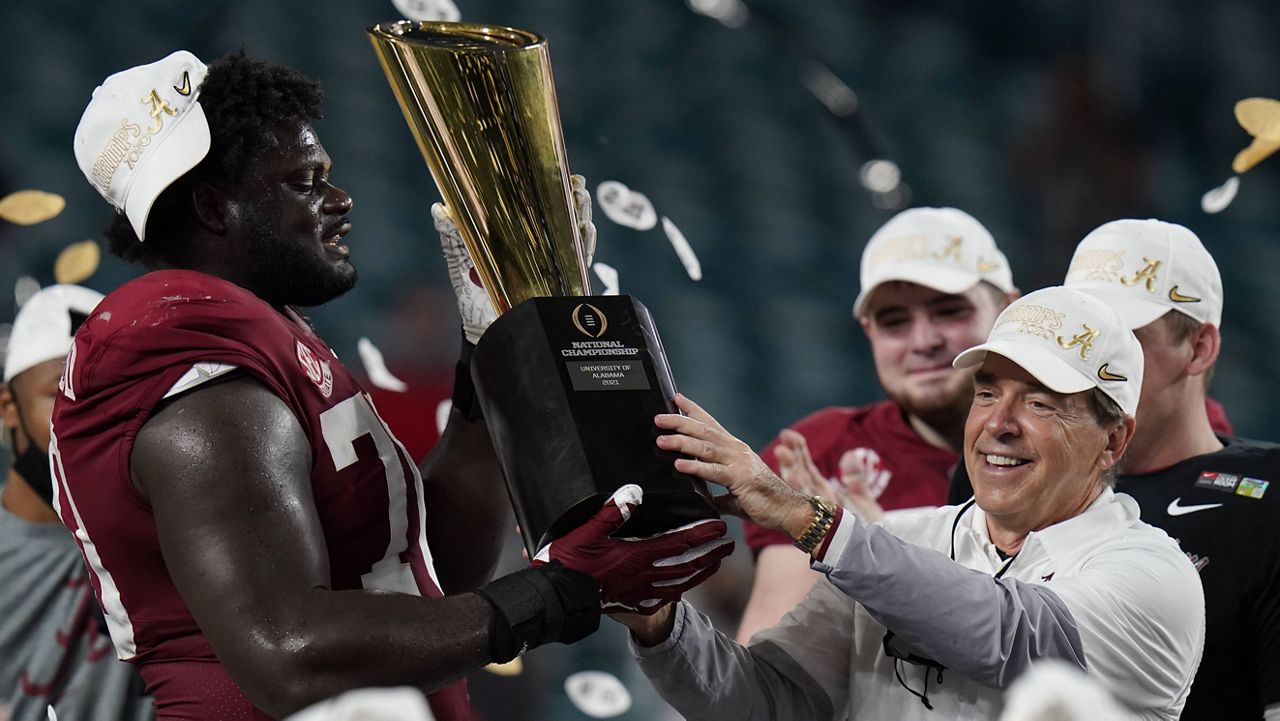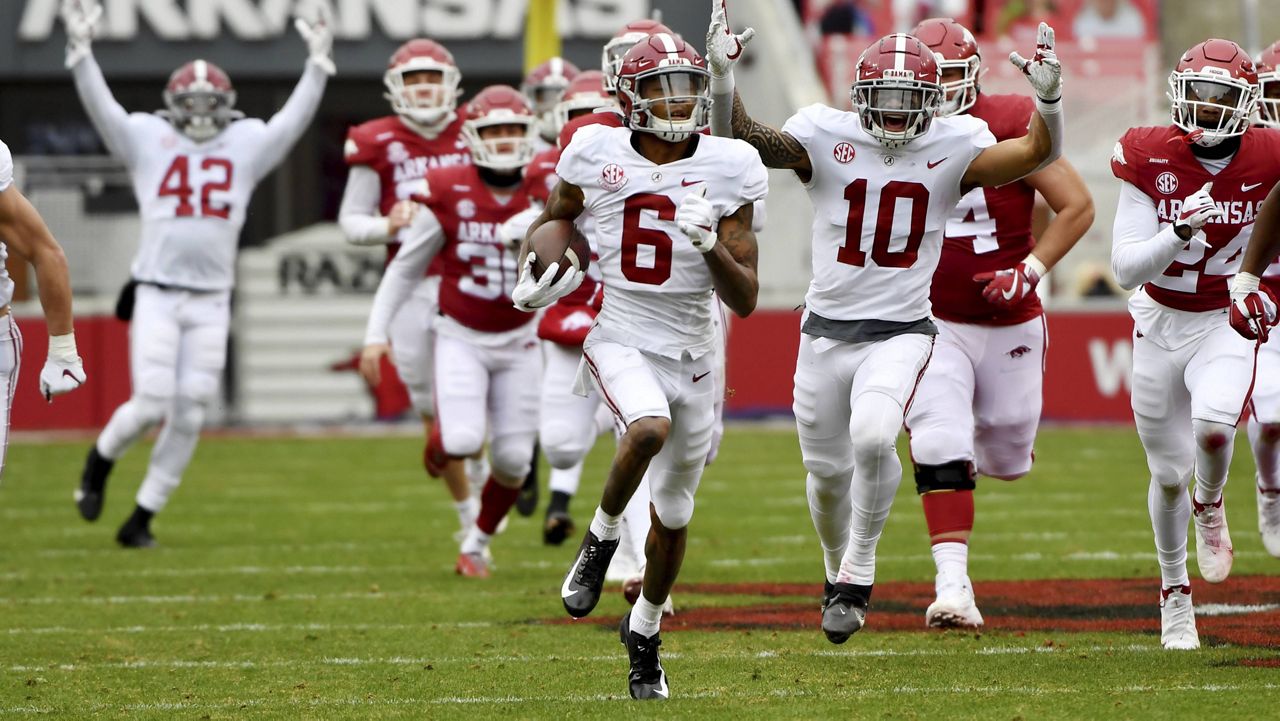The coronavirus pandemic has left college football bruised, and it could potentially have major ramifications on its playoffs.
What You Need To Know
- The pandemic has wreaked havoc on college football teams and their schedules, and it could potentially have major ramifications on its playoffs
- Eight games have been postponed or canceled this weekend, including five involving ranked teams
- Among the concerns, the lack of games played could hurt Ohio State's chances to be selected for the College Football Playoff
- With time running out, rescheduling games is becoming extremely challenging
Eight games have been postponed or canceled this weekend, including five involving ranked teams. In fact, three of the nation’s top five teams – Alabama, Ohio State and Texas A&M – are having to sit this one out due to COVID-19 infections either on their own team or on their opponents.
Four of the seven scheduled games in the Southeastern Conference, college football’s marquee league, had to be called off, most notably the meeting between No. 1-ranked Alabama and defending national champion LSU.
“This is certainly a week unlike any other,” SEC Commissioner Greg Sankey said. “I’ve repeatedly said (since March) that the circumstances around the virus will guide our decisions.”
More than 50 games this season have been postponed or canceled across college football.
The Big Ten and Pac-12 initially tried to punt their seasons to the spring. But they later reversed their decisions after the SEC, Big 12, Atlantic Coast Conference, and mid-major leagues proceeded to suit up.
As a result, the Big Ten and Pac-12 are playing abbreviated seasons. Big Ten teams attempted to play nine games in nine weeks, with the league hoping to keep its better teams in the running for the College Football Playoff.
But that has proved to be problematic.
No. 3 Ohio State’s game against Maryland on Saturday was canceled after eight Terrapins players tested positive for COVID-19. The lack of games could hurt Ohio State when the College Football Playoff committee meets next month to decide which four teams it will select.
"The health, safety and well-being of our student-athletes is our main concern," Ohio State coach Ryan Day said in a statement that has been echoed by practically every team that has had to call off a game this year.
The coronavirus has already dealt Clemson’s national title hopes a blow. Quarterback Trevor Lawrence, a Heisman Trophy candidate, missed the last two games after testing positive for COVID-19. With Lawrence playing, the Tigers routed their first six opponents. Without him, they squeaked out a win against unranked Boston College and lost to No. 4 Notre Dame.
Speaking of Notre Dame, their upset win was quickly overshadowed by hundreds of fans charging the field to celebrate, ignoring coronavirus safety guidelines and forcing the school to mandate testing for all involved.
The Big Ten finally returned to play Oct. 23, just as some Midwest states were among the worst in the nation in the number of rising coronavirus cases. Wisconsin, for example, played one game and then had to call off two others – against Nebraska and Purdue – after nearly two dozen of its players and staff contracted the virus.
Back in the SEC, Texas A&M coach Jimbo Fisher explained how just two cases can be a big deal. He said the Aggies’ road trip last week to South Carolina – using a small locker room and taking a plane trip – led to the multiple players landing in quarantine after being exposed to the infected individuals.
“We’ve got guys spread out all over, but it’s amazing on those airplanes how close 6 feet is,” said Fisher, who was uncertain whether his teams would have enough players back to be able to play Mississippi on Nov. 21.
With time running out, rescheduling games is becoming extremely challenging. LSU and Alabama, for example, do not have a common open date left on their schedules. Because it’s a premier matchup, there has been talk about shuffling other teams’ schedules to accommodate the game, or to play it Dec. 19 if neither team qualifies for the SEC championship game scheduled for that same day. Undefeated Alabama, however, is obviously the favorite from their division to reach the league title game.
Some are calling for the College Football Playoff to implement a single-site bubble, much like Major League Baseball did for its postseason, to protect against an outbreak wrecking the playoffs, which includes semifinals followed 10 days later by the national championship game.
“[I]s there anything about what’s happened over the past few weeks in college football that gives you confidence they’ll be able to pull this off without a last-minute COVID-19 problem cropping up during the 10-day periods where teams will be on campus, then traveling back and forth to different areas of the country?” USA Today columnist Dan Wolken wrote.
“Just look around at the carnage in the past several days," Wolken added.
CFP Executive Director Bill Hancock told Wolken there has not been any discussion about a single-site bubble, but Wolken predicted that, at the very least, the programs involved in the postseason would take extra precautions to keep tabs on their players.
The Associated Press contributed to this report.






